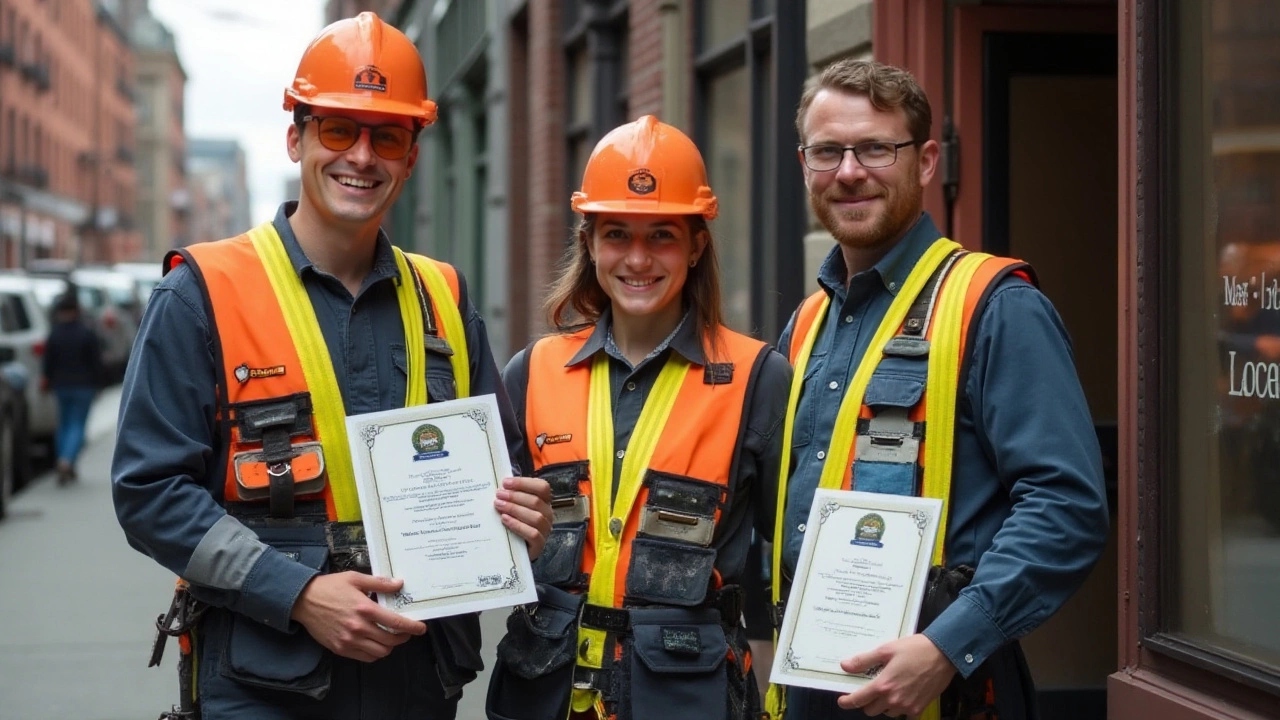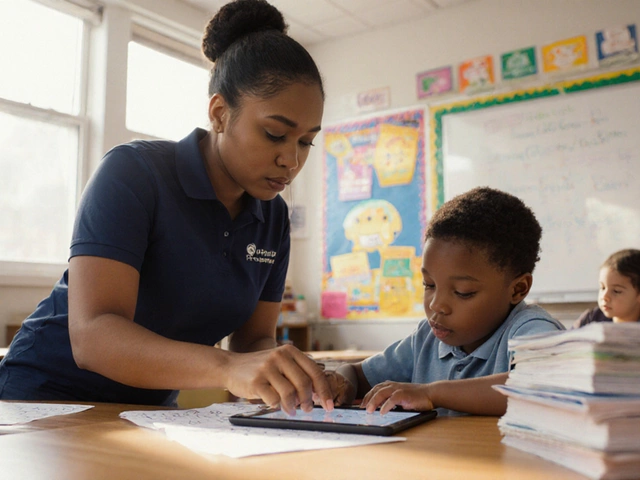Contemplating a career switch or just starting out in the workforce, becoming an electrician might have crossed your mind more than once, especially with the vibrant backdrop of Brooklyn to consider. This isn’t just about fixing light fixtures or rewiring kitchen outlets. It's about commencing a path in a field that powers the modern world — a profession that requires precision, dedication, and a fair share of training.
In today’s dynamic job market, electricians are prized for their knack at solving problems swiftly and safely. If you live in or near Brooklyn, you're in luck. The area not only offers numerous opportunities but also houses excellent training centers to launch your electrical career. Here’s what you need to know to start on this electrifying journey.
- Understanding the Role of an Electrician
- Education and Training Requirements
- Apprenticeships and Hands-On Experience
- Licensing and Certification Process
Understanding the Role of an Electrician
The role of an electrician is as vital as it is intricate, touching nearly every aspect of modern life. Electricians are the underappreciated heroes ensuring our homes, offices, and industries run smoothly. From installing new electrical systems in buildings to maintenance of electrical equipment, their scope of work is extensive and diverse. Within Brooklyn's lively urban landscape, the demand for skilled electrician training has never been higher. The intricate electrical networks foundational to the city's infrastructure rely on electricians' expertise to be both innovative and functional. In particular, electricians must understand complex blueprints, circuit diagrams, and building codes to carry out their tasks effectively.
Electricians are responsible for everything electrified that you can think of: lighting, computer networks, the power needed to run air conditioners in the blistering summer months, and the wiring buried within the walls or running through the streets. This means their work becomes a unique blend of hands-on craftsmanship and precise scientific knowledge. They don’t just work with their hands; they use their minds to troubleshoot and solve problems that might stump others. As Brooklyn evolves, so too does the complexity of its electrical systems, demanding electricians be adaptable and skilled at what they do.
Electricians work in a variety of environments; some are out in the field, repairing downed electrical lines post a heavy Brooklyn storm, while others might be tucked away in the depths of a new building's construction, installing the conduits that will one day power the lives within it. These professionals can also specialize further, becoming Brooklyn electricians who concentrate on residential, commercial, or industrial work. Specializations might even move into greener pastures, with electricians focusing on sustainable energy sources like solar power, something becoming ever more critical as the city strives for lower emissions and energy independence.
The educational path for becoming an electrician, especially in cultural hubs like Brooklyn, is not just about technical skill; it’s also about public safety and innovation. Electricians must follow strict safety regulations, given they work with components that can be as dangerous as they are essential. This dedication to safety and quality is overseen by organizations and requires rigorous testing and certification standards before anyone can claim the title. It is not just about getting the power turned on; it’s about knowing every intricate detail of how that process keeps people safe, and how it integrates with the larger electrical grid.
Professional electricians are in high demand across a slew of sectors, leading many to tout the occupation as not just a career but a lifelong professional journey. The ongoing need for electrical solutions in new construction, old building updates, and everyday maintenance makes electrical apprenticeship a promising entry point into a steady career. There is always something new on the horizon: new technology, new methodologies, and new challenges that make each day different from the last. Brooklyn, with its rapid growth and continually modernizing landscape, offers fertile ground for electricians eager for both reliable work and the chance to engage with cutting-edge technology.
"The only man who can tell a problem from an opportunity is an electrician." — Author unknown.
The entry point for many into the trade is often through apprenticeship programs that provide the hands-on experience and guided mentorship crucial for learning. These apprenticeships are a journey, combining classroom instruction from skilled professionals with in-the-field training. By starting out this way, up-and-coming electricians gain an invaluable perspective that marries both theoretical knowledge and practical application. For those starting anew, knowing that the work of an electrician can match every aspect of life, from work-life balance to financial stability, is immensely reassuring.

Education and Training Requirements
Embarking on the path to becoming a electrician in Brooklyn is about embracing a learning journey that combines both classroom education and hands-on practice. Traditionally, the first step is obtaining a high school diploma or its equivalent. It's here that foundational subjects like mathematics, science, particularly physics, offer invaluable insights into the laws of electricity and the dynamics of force and energy. These are fundamental skills for anyone hoping to advance in the technical field of electrical work.
For those ready to dive deeper into this trade, enrolling in a technical school or community college is a worthwhile investment. Many institutions offer certificate or associate degree programs in electrical technology. These programs often cover a broad spectrum of subjects, from electrical theory and safety practices to the National Electrical Code (NEC). Practical, hands-on training is vital. Programs frequently arrange workshop settings where students can practice with actual tools and materials to understand better their future working conditions.
Following educational groundwork is the crucial stage of apprenticeships. This experience involves working under the guidance of a licensed electrician, often for four to five years. It is an opportunity to apply what’s learned in the classroom to real-world scenarios. The U.S. Bureau of Labor Statistics notes that the average electrician apprenticeship is about 2,000 hours of on-the-job training per year, coupled with 144 hours of related classroom instruction. This is where budding electricians can polish their skills in installation, repair, and maintenance in various electrical systems.
For prospective electricians eager to ensure they're staying ahead, participation in continuing education courses is a smart move. These courses are essential to keeping up with new technologies, tools, and practices arising in a rapidly evolving field. Additionally, some states require continued education as part of the licensing process or renewal. This perpetual learning ensures you stay abreast of Industry trends and standards.
"Education is not preparation for life; education is life itself," said philosopher John Dewey, emphasizing the importance of lifelong learning in any career, particularly in one as essential and dynamic as electrical work.
The journey doesn't stop at completion of an apprenticeship, though, as licensing is typically required to work independently in Brooklyn. Passing the state licensing exam showcases a comprehensive understanding of electrical systems' technical and safety aspects. Remember, acquiring an electrician's license is not just a bureaucratic step; it’s an acknowledgment of your professional competence and dedication. Training as an electrician in today's Brooklyn means being part of a robust and innovative community with a deep history, and it opens up numerous pathways for specialized fields in the electrical industry.

Apprenticeships and Hands-On Experience
Embarking on a journey to become an electrician requires not just theoretical knowledge but substantial hands-on experience, which is where an apprenticeship plays a vital role. In Brooklyn, the vibrant construction and tech boom homes a plethora of opportunities for aspiring electricians to dive into real-world scenarios. Apprenticeships typically stretch over three to five years, blending both classroom instructions and practical job site training, making this path invaluable for grooming adept skills. During these years, apprentices are mentored by seasoned professionals who guide them through various practical challenges, emphasizing safety protocols and efficiency.
One of the notable advantages of pursuing an apprenticeship in Brooklyn is the diversity of projects you might be involved in. From historical brownstone renovations to setting up electrical systems in modern high-rises, the spectrum of experiences can be quite wide. Such varied exposure ensures that once you complete your apprenticeship, you're well-versed in dealing with a range of electrical setups and issues. It's common knowledge among tradespeople that the hands-on aspect of learning can't be replaced by books alone.
The United States Department of Labor (DOL) highlights the promising outlook for electricians, projecting a growth rate much faster than the average for all occupations. With Brooklyn at the heart of New York's dynamic infrastructure growth, the demand for skilled electricians continues to surge. Each year, about 79,900 openings for electricians are projected, on average, over the decade. Joining an apprenticeship program is not just about learning the trade but securely positioning yourself in a growing field.
Different firms and unions offer apprenticeship programs, and these often come with the added advantage of earning while you learn. It's a practical approach where, from day one, you're on the field, practicing skills that electricians utilize every day. Many programs, such as those by the International Brotherhood of Electrical Workers (IBEW), have established curricula that equip apprentices with the latest industry practices. This mix of mentoring, practical experience, and structured learning ensures all bases are covered.
A quote from Mike Holt, a renowned figure in the electrical industry education, resonates with many, "The more you sweat in practice, the less you bleed in battle." Those years spent training under the watchful eyes of skilled electricians sharpen problem-solving skills and give apprentices the confidence to tackle complex situations independently. This confidence cannot be underestimated, especially when dealing with tasks that demand precision and caution.
When choosing an apprenticeship, it's also essential to consider whether the training aligns with your career aspirations. Some programs focus on residential wiring, while others might emphasize commercial or industrial electrical work. Thus, getting into a program that matches your interests can significantly impact your learning satisfaction and career trajectory. For those considering this path, an apprenticeship is the cornerstone upon which you build your electrician career, providing stability, experience, and the kind of know-how that employers value tremendously.

Licensing and Certification Process
Embarking on the path to becoming an electrician in Brooklyn is a bit like setting out on a great adventure. A big part of this journey is acquiring your license, which solidifies your status as a professional in the field. In New York, specifically Brooklyn, securing a license isn't just a formality — it's a necessity and a testament to your dedication and expertise. Before you can ply your trade unsupervised, you must meet certain criteria that signal to the state and your potential clients that you are qualified to handle the complexities of electrical systems safely and effectively.
The road to obtaining your license starts with education and a recognized electrical apprenticeship. Once you've clocked in your on-the-job training hours, usually around 8,000, alongside classroom instruction, you become eligible to apply for that golden ticket — your licensing exam. These exams are comprehensive, testing not only your practical know-how but also your understanding of state codes and regulations. It's no small feat, but the sense of achievement is unparalleled once it’s in your hands.
Passing the exam is often accompanied by a background check. This ensures that prospective electricians are not only technically proficient but also trustworthy and reliable. It's worth noting that a solid reputation helps tremendously; word of mouth remains a strong currency in the local trades. Many electricians often reflect on Winston Churchill's saying:
"Success is not final, failure is not fatal: It is the courage to continue that counts."It's this courage and resilience that carries professionals through the rigorous process.
Another vital milestone post-exam is maintaining your license. For electricians, this means keeping up with continuing education requirements. The electrical field is one that evolves with technological and safety standards, and continuous learning is key. Brooklyn offers various workshops and courses that not only help you stay compliant but expand your skill set to include the latest in sustainable practices and innovative technology. Consider these opportunities as investments in your professional growth and capability.
Getting licensed isn’t merely about checking off boxes; it’s about becoming part of a community of skilled trade professionals who are essential to the functioning of modern life. The commitment to education, adherence to regulations, and the consistent renewal of your knowledge base demonstrate a dedication that your clients in Brooklyn will value. As the city evolves, so must the electricians who keep its intricate systems running smoothly. Embrace each step of the licensing process as not only a challenge but also as a significant stepping stone towards becoming a trusted name in the Brooklyn electrician community.





Write a comment